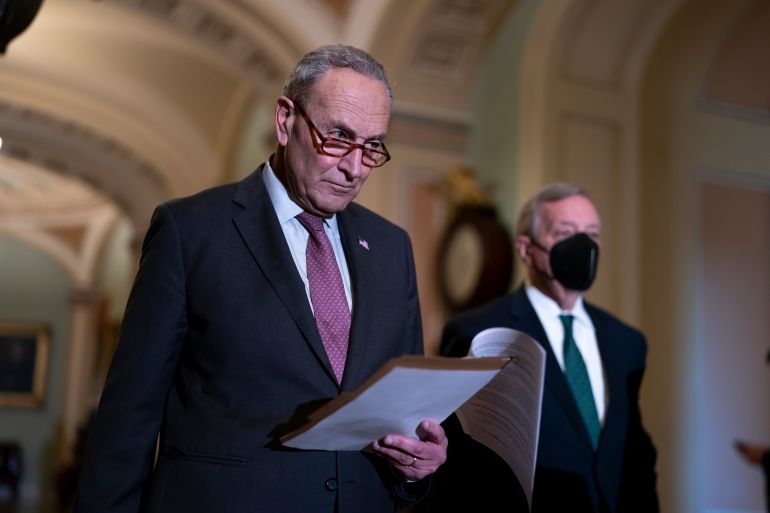US set to avert default as Congress approves debt limit hike
The $2.5 trillion increase comes just days before experts say the US would not be able to service its debt commitments.

The United States Congress has moved to avert a debt default that experts and officials have said would have had a catastrophic effect on the country’s economy.
In the early hours of Wednesday, the House of Representatives passed a $2.5 trillion increase to the federal debt limit. That came hours after the Senate also passed the measure, which likely staves off the next showdown over lifting limits on how much money the government can borrow until at least 2023.
Keep reading
list of 3 itemsBiden warns Republicans against blocking debt limit increase
Powell, Yellen warn of ‘devastating’ impact of US debt default
“No brinksmanship, no default on the debt, no risk of another recession: responsible governing has won on this exceedingly important issue,” Senate Majority Leader Chuck Schumer said on the floor ahead of the votes. “The American people can breathe easy and rest assured there will not be a default.”
The legislation passed in both chambers along party lines, with just one Republican in the House voting in favour. It is expected to be signed into law by President Joe Biden on Wednesday.
The US currently has about $29 trillion in debt. The borrowing cap approved on Wednesday will be $31.5 trillion.
The passage followed an 11th-hour deal between Republican and Democratic brass that saw legislators create a special mechanism that allowed the debt limit increase to pass with a simple majority in each chamber, enabling Democrats to pass the legislation and Republicans to remain in opposition.
Some 80 years ago, lawmakers introduced a limit on how much federal debt could be accrued. That limit is regularly lifted, often with little fanfare.
While both parties see raising the debt ceiling, which kicks the can down the line in terms of the US addressing its ballooning debt, as politically toxic, Republicans are particularly expected to use the issue to attack what they call Democratic “overspending” in the upcoming 2022 midterm elections.
The Bipartisan Policy Center, an independent Washington-based think-tank, had predicted the US would no longer be able to service its debts sometime after December 21.
Treasury Secretary Janet Yellen, meanwhile, set the deadline at the start of the business day on Wednesday.
A default was projected to cost an estimated six million jobs and $15 trillion in household wealth, as well as increase the costs for mortgages and other borrowings.
The US spends more money than it collects through taxation, so it borrows via the issuing of Treasury bonds, which are government securities available for purchase by individuals, institutions and countries.
“Addressing the debt limit is a basic responsibility of the federal government,” the White House said in a statement following approval by Congress.
“Passage of this legislation will allow the Treasury to finance spending and tax cuts Congress has already authorised and to keep its commitments without causing disruption or harm to our economy and American families.”